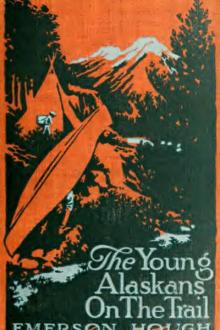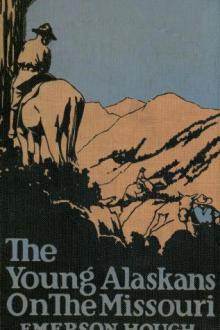Young Alaskans in the Far North by Emerson Hough (ereader android .txt) 📕

- Author: Emerson Hough
- Performer: -
Book online «Young Alaskans in the Far North by Emerson Hough (ereader android .txt) 📕». Author Emerson Hough
“It is a hard fight which the Church wages with the fur trade in the North. We are antagonistic, although we live side by side, both Anglican and Catholic missions, almost in the dooryard of the Hudson’s Bay Company and Revillons and all the smaller fry of independents which are pushing in now. But we do our best.
“Now, then, young sir,” he resumed, turning to Rob, “I have no doubt that your notes are as good as this young man’s map. I hope you will keep up your diary just as I have done in much of my exploration work in Alaska and the Northwest Territory. These things are invaluable in later life.”
Rob thanked his host very much, and promised to do as he advised. Therefore, what he found of interest at this, the first considerable American settlement they met on the Yukon, should prove worth setting down in his own words.
XV THE FUR TRADEThe memoranda which the historian of the party set down regarding Fort Yukon had more or less to do with the scenes and incidents connected with the fur trade which had come under his observation. But before coming to these Rob put down a few things regarding the nature of this American settlement on the great river of Alaska:
“Saturday, August 9th.—We had forks and napkins at the archdeacon’s house. Went out to see the town. Indian tents scattered over three-fourths of a mile. Three stores, a post-office, a church, and a road-house. Found the owners of the store at Old Crow which we burglarized, and paid them for what we got. They said it was all right. Seems as though there are hundreds of dogs here. Boat expected up the Yukon almost any day—there is no regular time for their landing here.
“Sunday, August 10th.—Went to church in the log church. The archdeacon preached. A full-blood by the name of David interpreted. Another native read the liturgy, but not very well. The sermon was simple and plain. He touched the natives’ pride. Told them how they used to get along with bows and arrows and stone axes, how they conquered the wilderness; told them not to forget those virtues and not to give way to the vices of white people. Many strange faces in the audience. Saw one like a Japanese samurai, with bristling beard and stiff black hair. Have seen this type everywhere these last 1,500 miles—people who look like Japs. I don’t think much law and order here. White men married to Indian women. There is a government school and a good many Indian children go there. The men get too much whisky here.
“The archdeacon is a great traveler. He told me why people up north like bright-colored clothes. He says that the hind sack on his sled is brilliantly embroidered, and when he is mushing dogs he finds himself looking at this bright piece of color. All the landscape is very monotonous, and the night is hard to endure so long. He says that is why the natives like bright colors.
“This afternoon in the archdeacon’s house I found a strange old book. It seems to have been written by some preacher some hundreds of years ago. His name was Bartolomeo de Las Casas. He must have been a Spaniard, for he is writing about the Indians. He says, ‘We are killing them, and have done so relentlessly.’ Seems to me that was a good deal like the fur trade. He goes on and says some more from Ecclesiastes: ‘The Most High is not pleased with the offerings of the wicked. Neither is He pacified for sin by the multitude of sacrifices. Whoso bringeth an offering of the goods of the poor doth as one that killeth the son before the father’s eyes.’
“Well, that sounds as though some one were writing at the big fur monopolies and the way they handle the Indians. Las Casas says that his Church thought they owned all the middle part of this continent. The Hudson’s Bay Company started in to own all the northern part of it. I can’t see the difference. Las Casas says the discovery and conquest of the American dominions has wrought ruin to Spain as a nation. The results were ‘disastrous to her power.’ I am only a boy, and don’t know much about things, but I know perfectly well the fur trade is based on injustice. I consider it the most ignoble form of business in the world. I think it is pulling down the Indians—as the archdeacon said in his sermon, they were more manly and self-respecting before the traders came. If the government of Canada claims to be so good, it might look into the injustice done to the native people by some of the traders, both the old companies and the independents. I have read somewhere, ‘No right is or can be founded on injustice.’ So what rights have they got?
“The Spaniards were after gold, and these big companies are after fur. They have both relied on keeping the natives down. That’s why they are so jealous of outsiders getting any knowledge about their ways.
“I have heard that an Indian always pays his debts to the trader. On this trip I heard a man say that the big companies never forgive an Indian a debt in all his life. He would not dare to let his debt run if he could pay it, because if he did he would starve.
“I wonder if old Mr. Las Casas was any relation to the archdeacon here. They both preach a good deal alike, it seems to me. He says, ‘The system of oppression and cruelty in dealing with the natives makes them curse the name of God and our holy religion.... For should God decree the destruction of Spain it may be seen it is because of our destruction of the Indians, and that His justice may be made apparent.’
“Well, I guess that will be all I will write out of the book. I was just thinking that what the Spaniards did in getting gold was something like what the white men are doing to-day in getting fur in this northern country. It never did look good to me.
“But though the Indians don’t always remember everything they hear in church, I believe the Church is honester, whether it is the English Church or the Catholic, or any of them, because they haven’t anything to get out of it, so far as I can see, and the traders have. I don’t think I shall very much enjoy seeing fine furs worn by ladies in my own country after this—I know where they come from and what they cost. I wonder what Las Casas would say if he were here.
“A good many Scotchmen are through this northern country, and some Scandinavians. I read in a book by Mr. Stewart that you could tell the Scotchman even in a half-breed because he always says ‘boy’ and ‘whatever’ the way the Highlanders do—no matter how old you are a Highlander always calls you ‘boy.’ He says the Bishop of Saskatchewan had a half-breed boy working for him who always called him ‘Boy my Lord.’ That seems odd to me! And then about their saying ‘whatever’—a Scotch half-breed said, ‘We use it because we could not express ourselves without it whatever.’ And then he said, ‘Is it not correct whatever?’ And after a while he said he could see no objection to that word whatever. A Highlander always says ‘whatever,’ and you can’t keep him from it. I noticed that in some of the posts we came through.
“A woman here was sixty years old, and she married a carpenter, and he took her money and started a sawmill. They haven’t got any sawmill now.
“A good many people here talk about other people. I have noticed that in almost any small place, but I think it is worse up here in the North. I suppose they get lonesome and have to talk.
“Another thing is, they drink so much up in this country whenever they get a chance. They don’t keep their gallon of Scotch whisky, which is supposed to last them a year, but sit down and drink it up in two days. So they get out of whisky and some people get crazy for it. In this same book by Mr. Stewart he tells about some men at one of the trading-posts of the Mackenzie who didn’t have any liquor, but the summer before there had been a party of scientists there who had left some insects, bugs, and snakes and things, done up in alcohol. Some other traders visited this agent, and he was sorry not to have anything to give them to drink. So he thought he would pour off this alcohol from the bugs and things. Still, he thought it might be poison, so he tried it on a half-breed dog-driver. It did not kill him, so he served it to his friends, and said nothing about it, and they all thought it was very good! I believe this is a true story, because so many things happen up in this country that we don’t hear about at home.
“Monday, August 11th.—This is on the steamship Schwatka, and we are bound up the Yukon! We said good-by early this morning to the good archdeacon. It was dark when he heard the dogs howling, and knew a boat was coming, so he called us and we hurried and got dressed, and just got on this boat in time. She isn’t towing any barge, so ought to make good time up to Dawson. We were sorry to leave the archdeacon, but we are glad to be on our way home.
“We get four meals a day on the Schwatka, and very good ones. John is happy! We think we will all put on a little flesh before we get home. Uncle Dick is writing and going over his notes. John is making his map. Jesse is reading. So I write.
“Tuesday, August 12th.—At 1.30 in the morning we made Circle City, which, as everybody knows, is right on the Arctic Circle, or was supposed to be. This was the first time Uncle Dick could get out any word. He sent out a message by wireless which will be relayed to Skagway and cabled to Valdez. He said in about ten days we would be at Skagway. Our folks will be mighty glad to hear from us—and how glad we’ll be to get home! We are still inside the limit of the time schedule which Uncle Dick set for us. Now we think we are safe to finish the journey inside our schedule. Pretty good, we all think.
“Wednesday, August 13th.—At 8.30 this morning got to Eagle, which is an old Alaska settlement and was once an army post. There is an Anglican mission here. The scenery around here is far beyond anything that was on the Mackenzie River. We all like the Yukon better than the Mackenzie. Some Church people going out on the boat from here.
“I don’t know how the Klondikers got up the Yukon after they had come over the Rat Portage; but Dawson is three days above Fort Yukon by steamboat. If they tracked or poled or





Comments (0)